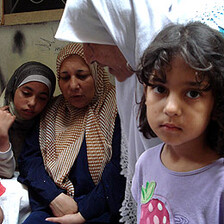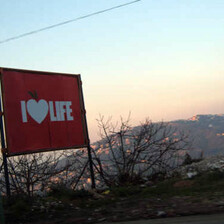Beirut 14 July 2006

Syrian TV images of a bridge bombed by Israel. In the Arab world not to mention in Lebanon itself people were glued to their television sets in horror at Israel’s decimation of the civilian infrastructure. (EI)
In just a few short hours, a city bubbling with life turned into a ghost town, except from the supermarket, the bakeries and gas station where people lined up to get supplies. Almost everybody I talked to Thursday believed the offensive would be not a matter of days but weeks — maybe months: “After all, who is going to stop them — the Arab regimes or the international community?!”, asks my neighbor, who just started having pains all over her body from stress and fear. “I am scared; enough is enough!” she said.
I live in a neighborhood that is largely supportive of the 14 March 2006 coalition, i.e., my neighbors tend to be critical of Hezbollah and its relation to Syria. The first reaction here, however, was very supportive of the Hezbollah operation two days ago. I first knew of the Hezb operation from screams of joy arising all around the neighborhood. The pharmacist with whom I have argued many times about Syria and the resistance was happy “The IDF deserves it! Is it right what they are doing to the Palestinians in Gaza? Let them take it! Now three soldiers — what are they going to do?”. Then he said: “God bless us though, what will Israel do now? They won’t allow for such an operation; they will go crazy!”
His feelings echoed the spontaneous feelings of most people in our neighborhood: happy and victorious but at the same time worried and scared about the consequences. After all, Israel acts with impunity in the absence of any international critique of its politics and military actions in Palestine and in Lebanon.
The instantaneous expression of joy in my neighborhood stemmed from profound feelings of frustration and helplessness on the Arab street about what was going on in Gaza. Reports of the IDF using chemical weapons, and scenes of patients with missing body parts, family homes destroyed, hunger, poverty and fear are too much to bear.
“What is it they are going to do? Will they hit the electricity plant, like every other time?” another neighbor in the pharmacy asked, referring to the previous Israeli incursions into Lebanon to hit the main power station after each Hezbollah operation. “After all, they won’t dare invade; it is too costly for them, and they will have to sit at the table and negotiate and exchange for soldiers, the question is now how many lives will be taken and how much damage will be inflicted before they accept that,” he concluded somberly.
It did not take long for all of us to realize what the Israelis would target: bridges, airports, roads, power stations, and other key economic infrastructure. The offensive was much more violent than our neighborhood expected, however. The operation came at a time when Israel is trying to break the will of Palestinians in Gaza by refusing to negotiate about the exchange of Palestinian prisoners for the IDF soldier. In Lebanon, too, Israel has chosen to start a psychological war against the civilian population rather than pursue diplomacy or respect the laws and wishes of the International Community.
Israel’s aim in Lebanon appears to be to split civil society from the resistance, create a state of anger and dissatisfaction in an already politically divided society, and force the implementation of UN Security Council Resolution 1559, which entails the disarming of Hezbollah.
Any Lebanese citizen in the street knows that the Israel’s intensive shelling and the massive offensive – “Operation Just Reward” — won’t end with the liberation of the Israeli soldiers who are being kept as prisoners of war. Besides the economic infrastructure, Israelis are picking one house in each village, destroying it totally and killing its residents, in an effort to turn the residents of the south against the resistance and hence create, at the end of the day, a state of despair which will pave the way for the implementation of UNSC Resolution 1559.
Furthermore, Israel’s immediate and harsh rebukes to the Lebanese government and their claims that they won’t allow for the return of Hezbollah to the borders echoes the message that Lebanon will be forced to implement UNSC Resolution 1559.
The question now is whether the offensive will backfire on the Israelis, as it has in Gaza, and whether the Lebanese will stand by the resistance and transcend their internal political divisions at the moment, or whether the psychological war will work its dark magic. Reports from Lebanese TV stations, regardless of their political affiliation, seem to reflect a state of unity between the resistance and Lebanese society, a goal that Druze MP Walid Jumblatt, the leader of the opposition and the main supporter of UNSC Resolution 1559, called for in his first reaction to the Israeli offensive.
Meanwhile, we wait anxiously to see what happens next.
Related Links
Mayssoun Sukarieh is writing from her hometown of Beirut.





